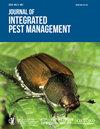Knowledge, attitudes, and practices on mosquito control in urban informal settlements of Lagos, southwest Nigeria
IF 2.7
3区 农林科学
Q1 ENTOMOLOGY
引用次数: 0
Abstract
Abstract The knowledge, attitudes, and practices (KAP) on the control of mosquitoes and mosquito-borne diseases were investigated in urban informal settlements of Lagos State, Nigeria, during the coronavirus disease 2019 (COVID-19) period. The survey was conducted between December 2021 and March 2022 using a cross-sectional approach in the informal settlements of Bariga, Makoko, and Ajegunle, and in the formal settlement of Ikeja, all in Lagos State. A total of 400 semistructured questionnaires, 100 per community, were administered to consenting adult participants, and the data collected were analyzed using descriptive and inferential statistics. The results showed that of the total respondents, 262 (65.5%) claimed to have previously seen mosquito larvae, while 54.2% of the total were aware that larvae usually develop into adult mosquitoes. Only 167 (41.8%) of the respondents owned insecticide-treated bed nets, out of which 126 (75.4%) slept under such bed nets. The rate of bed net ownership and reasons for not using them were significant in relation to the study communities. The majority of respondents (81.2%) reported using aerosol insecticides almost daily, potentially contributing to the challenge of insecticide resistance in mosquito vectors. Of the mosquito-borne diseases endemic in Nigeria, malaria was the most well-known by respondents (62.7%), followed by yellow fever (13.6%), and lymphatic filariasis (1.5%). These findings highlight the need for both public education on mosquito control and government interventions in urban informal settlements.尼日利亚西南部拉各斯城市非正式住区关于蚊虫控制的知识、态度和做法
摘要调查尼日利亚拉各斯州城市非正式住区居民在2019冠状病毒病(COVID-19)暴发期间蚊虫和蚊媒疾病控制的知识、态度和行为(KAP)。该调查于2021年12月至2022年3月期间在拉各斯州的Bariga、Makoko和Ajegunle的非正式定居点以及Ikeja的正式定居点采用横断面方法进行。共有400份半结构化问卷,每个社区100份,对同意的成年参与者进行调查,收集的数据使用描述性和推理统计进行分析。结果表明,有262人(65.5%)表示曾见过蚊幼虫,54.2%的人表示幼虫通常会发育成蚊。只有167人(41.8%)拥有驱虫蚊帐,其中126人(75.4%)睡在驱虫蚊帐下。蚊帐拥有率和不使用蚊帐的原因在研究社区中具有显著性。大多数答复者(81.2%)报告说,他们几乎每天都使用喷雾杀虫剂,这可能加剧蚊虫媒介对杀虫剂产生抗药性的挑战。在尼日利亚流行的蚊媒疾病中,被调查者最熟悉的是疟疾(62.7%),其次是黄热病(13.6%)和淋巴丝虫病(1.5%)。这些发现强调了在城市非正式住区开展蚊虫控制方面的公众教育和政府干预的必要性。
本文章由计算机程序翻译,如有差异,请以英文原文为准。
求助全文
约1分钟内获得全文
求助全文
来源期刊

Journal of Integrated Pest Management
Agricultural and Biological Sciences-Insect Science
CiteScore
5.80
自引率
3.60%
发文量
24
审稿时长
25 weeks
期刊介绍:
Journal of Integrated Pest Management is an open access, peer-reviewed, extension journal covering the field of integrated pest management. The Editors-in-Chief are Dr. Marlin E. Rice (formerly with Iowa State University) and Dr. Kevin L. Steffey (formerly with the University of Illinois). The journal is multi-disciplinary in scope, publishing articles in all pest management disciplines, including entomology, nematology, plant pathology, weed science, and other subject areas.
 求助内容:
求助内容: 应助结果提醒方式:
应助结果提醒方式:


